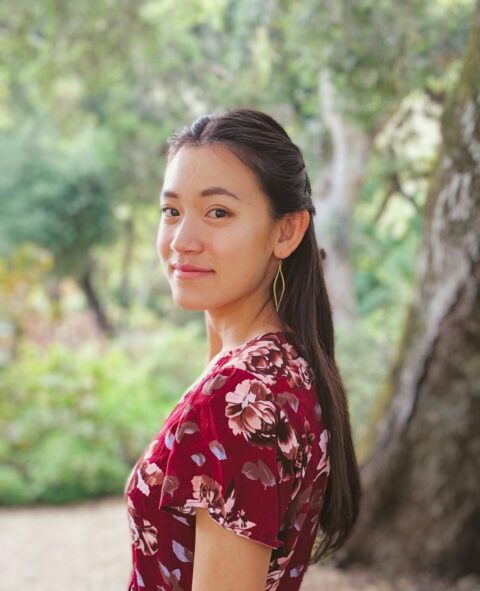Your story has a character who daily, maybe even ritualistic, engages in a morning swim. Do you have meditative rituals in your own life?
I love rituals, but I find that I can only make space for a very finite set of them in my life. I journal every night and have since 2015 (!); it’s a ritual that’s so regular that it feels like hygiene—icky when skipped.
I was struck by the line “He has never tasted starfish.” Neither have I. But, unlike Liu, I’ve never walked past someone grilling starfish, either. There is food represented throughout the story, but all the fish available in the market don’t seem to entice him as much as the sea cucumber he remembers from his past and, perhaps, the starfish.
Every time I read the story I have a different idea as to why he’s never tasted starfish. Is it a delicacy he cannot afford? Is it something he is morally against or physically averse to?
I wrote “The Winter Swimmer” after visiting Dalian, a city that I lived in as a child but was too young to remember, for the first time as an adult. The fisherman’s wharf in Dalian is a real and lively place, filled with all forms and formats of seafood, including smoky grilled starfish. I visited the wharf with my aunt, who has lived in Dalian all her life. When we passed the starfish vendor, she seemed intrigued, and confessed she had never eaten starfish before. We both tried it for the first time together. I was moved by this; the contrast of abundant seafood in Dalian and the reality of locals who scarcely visit more tourist-y sites like the fisherman’s wharf unless it’s to swim or procure seafood of their own. There’s a sense that starfish is for visitors and not really for the people in Dalian. Liu reminds me of my aunt, someone down-to-earth who might not think to try starfish by himself. Someone who would likely enjoy it if he did.
I love how you describe the water as enveloping, kissing, touching, holding, but also painful like prickly socks. Liu’s water experience contrasts to the experience of his wife and daughter. There is contrast in the natural vs man-made baths, sea touch vs human touch, solitary vs accompanied excursion, unfashionable vs fashionable, ritualistic vs occasional. How intentional were these contrasts?
This is a great question! I very much feel that this story was propelled by the question of touch. I wrote this story after a long period of living on Christmas Island, an island where I lived near enough the sea to swim every day. During those months, I spent more time regularly in the water than I ever have before, and swimming with regularity– at different times of day, different tide heights, different temperatures– made me aware of how much swimming is an experience of touch. Currents, thermoclines, even the tingling of cold were unique sensations to swimming that my body could perceive with increasing degrees of clarity. In this story, I wanted to explore a character who feels a similar sense of ritual and regularity around swimming and is, despite the world around him, and possibly despite his own temperament, attuned to the sensual qualities of swimming and being in any ocean.
Your story shows a healthy respect for the sea and nature represented by the sea. It also speaks of changes—both in how the sea/swimming is regarded (ritual vs unfashionable) and in what is available (sea cucumbers and lack thereof). Does nature, in some form, play a big role in your writing?
It certainly does! I like to write from a sense of place and understanding place (to me) often requires understanding the many bodies that coexist there, including bodies of water. As you might be able to tell, I love spending time in the sea, and my experiences with water and the bodies that inhabit it motivate many of the questions about sensation and touch that I aim to ask through writing.
I love that you added the Chinese 冬游. I am bilingual/cultural and find that there are words that are untranslatable and the attempt to translate can sometimes diminish. Why did you choose to keep the Chinese and the translation? If you were to expand on the translation, does “Winter Swim” fully translate the concept you write of or are there other elements to the word(s) or expression that cannot be conveyed in a word-to-word translation?
In Chinese, “冬游” is a recognizable phrase in a way that “winter swim” is not. I had an uncle who was known for 冬游, and our family talks about him that way—like 冬游 is a particular sport, or even a practice, that he did, rather than just a characteristic of the swims he took. 冬游 seems to be about the season but also about being in an open body of water, of leaning into winter and in some ways rebelling against it. Particularly in Dalian, where the sea gets so cold in winter, the fortitude and physical robustness needed to 冬游 sets it apart from other kinds of swimming.



 The SmokeLong Grand Micro Contest (The Mikey) is now an annual competition celebrating and compensating the best micro fiction and nonfiction online.
The SmokeLong Grand Micro Contest (The Mikey) is now an annual competition celebrating and compensating the best micro fiction and nonfiction online.